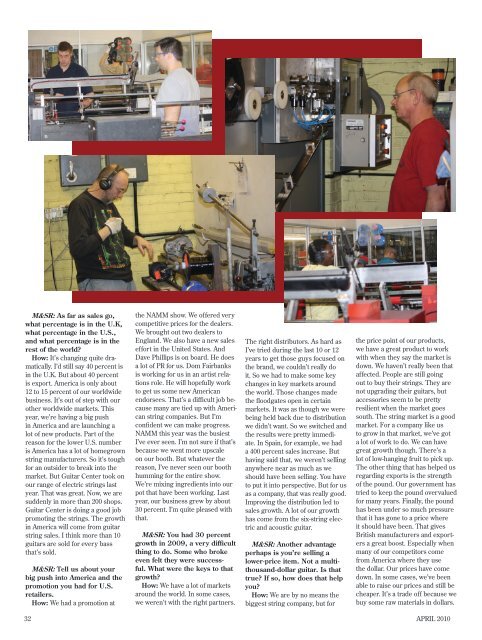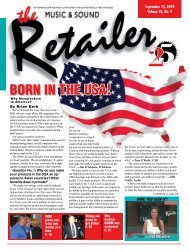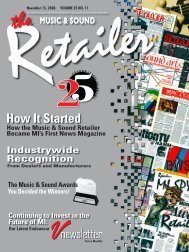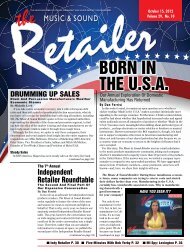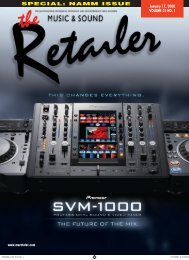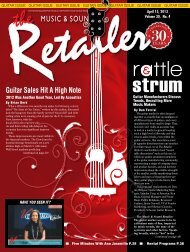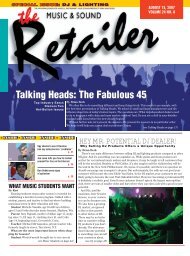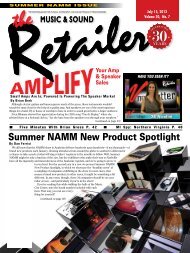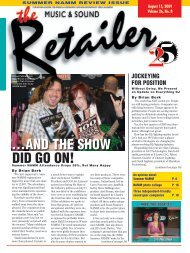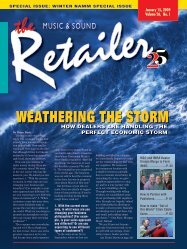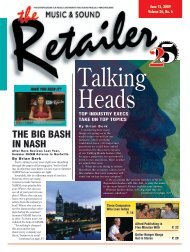laTeST - Music & Sound Retailer
laTeST - Music & Sound Retailer
laTeST - Music & Sound Retailer
You also want an ePaper? Increase the reach of your titles
YUMPU automatically turns print PDFs into web optimized ePapers that Google loves.
M&SR: As far as sales go,<br />
what percentage is in the U.K,<br />
what percentage in the U.S.,<br />
and what percentage is in the<br />
rest of the world?<br />
How: It’s changing quite dramatically.<br />
I’d still say 40 percent is<br />
in the U.K. But about 40 percent<br />
is export. America is only about<br />
12 to 15 percent of our worldwide<br />
business. It’s out of step with our<br />
other worldwide markets. This<br />
year, we’re having a big push<br />
in America and are launching a<br />
lot of new products. Part of the<br />
reason for the lower U.S. number<br />
is America has a lot of homegrown<br />
string manufacturers. So it’s tough<br />
for an outsider to break into the<br />
market. But Guitar Center took on<br />
our range of electric strings last<br />
year. That was great. Now, we are<br />
suddenly in more than 200 shops.<br />
Guitar Center is doing a good job<br />
promoting the strings. The growth<br />
in America will come from guitar<br />
string sales. I think more than 10<br />
guitars are sold for every bass<br />
that’s sold.<br />
M&SR: Tell us about your<br />
big push into America and the<br />
promotion you had for U.S.<br />
retailers.<br />
How: We had a promotion at<br />
the NAMM show. We offered very<br />
competitive prices for the dealers.<br />
We brought out two dealers to<br />
England. We also have a new sales<br />
effort in the United States. And<br />
Dave Phillips is on board. He does<br />
a lot of PR for us. Dom Fairbanks<br />
is working for us in an artist relations<br />
role. He will hopefully work<br />
to get us some new American<br />
endorsees. That’s a difficult job because<br />
many are tied up with American<br />
string companies. But I’m<br />
confident we can make progress.<br />
NAMM this year was the busiest<br />
I’ve ever seen. I’m not sure if that’s<br />
because we went more upscale<br />
on our booth. But whatever the<br />
reason, I’ve never seen our booth<br />
humming for the entire show.<br />
We’re mixing ingredients into our<br />
pot that have been working. Last<br />
year, our business grew by about<br />
30 percent. I’m quite pleased with<br />
that.<br />
M&SR: You had 30 percent<br />
growth in 2009, a very difficult<br />
thing to do. Some who broke<br />
even felt they were successful.<br />
What were the keys to that<br />
growth?<br />
How: We have a lot of markets<br />
around the world. In some cases,<br />
we weren’t with the right partners.<br />
The right distributors. As hard as<br />
I’ve tried during the last 10 or 12<br />
years to get those guys focused on<br />
the brand, we couldn’t really do<br />
it. So we had to make some key<br />
changes in key markets around<br />
the world. Those changes made<br />
the floodgates open in certain<br />
markets. It was as though we were<br />
being held back due to distribution<br />
we didn’t want. So we switched and<br />
the results were pretty immediate.<br />
In Spain, for example, we had<br />
a 400 percent sales increase. But<br />
having said that, we weren’t selling<br />
anywhere near as much as we<br />
should have been selling. You have<br />
to put it into perspective. But for us<br />
as a company, that was really good.<br />
Improving the distribution led to<br />
sales growth. A lot of our growth<br />
has come from the six-string electric<br />
and acoustic guitar.<br />
M&SR: Another advantage<br />
perhaps is you’re selling a<br />
lower-price item. Not a multithousand-dollar<br />
guitar. Is that<br />
true? If so, how does that help<br />
you?<br />
How: We are by no means the<br />
biggest string company, but for<br />
the price point of our products,<br />
we have a great product to work<br />
with when they say the market is<br />
down. We haven’t really been that<br />
affected. People are still going<br />
out to buy their strings. They are<br />
not upgrading their guitars, but<br />
accessories seem to be pretty<br />
resilient when the market goes<br />
south. The string market is a good<br />
market. For a company like us<br />
to grow in that market, we’ve got<br />
a lot of work to do. We can have<br />
great growth though. There’s a<br />
lot of low-hanging fruit to pick up.<br />
The other thing that has helped us<br />
regarding exports is the strength<br />
of the pound. Our government has<br />
tried to keep the pound overvalued<br />
for many years. Finally, the pound<br />
has been under so much pressure<br />
that it has gone to a price where<br />
it should have been. That gives<br />
British manufacturers and exporters<br />
a great boost. Especially when<br />
many of our competitors come<br />
from America where they use<br />
the dollar. Our prices have come<br />
down. In some cases, we’ve been<br />
able to raise our prices and still be<br />
cheaper. It’s a trade off because we<br />
buy some raw materials in dollars.<br />
32 April 2010


